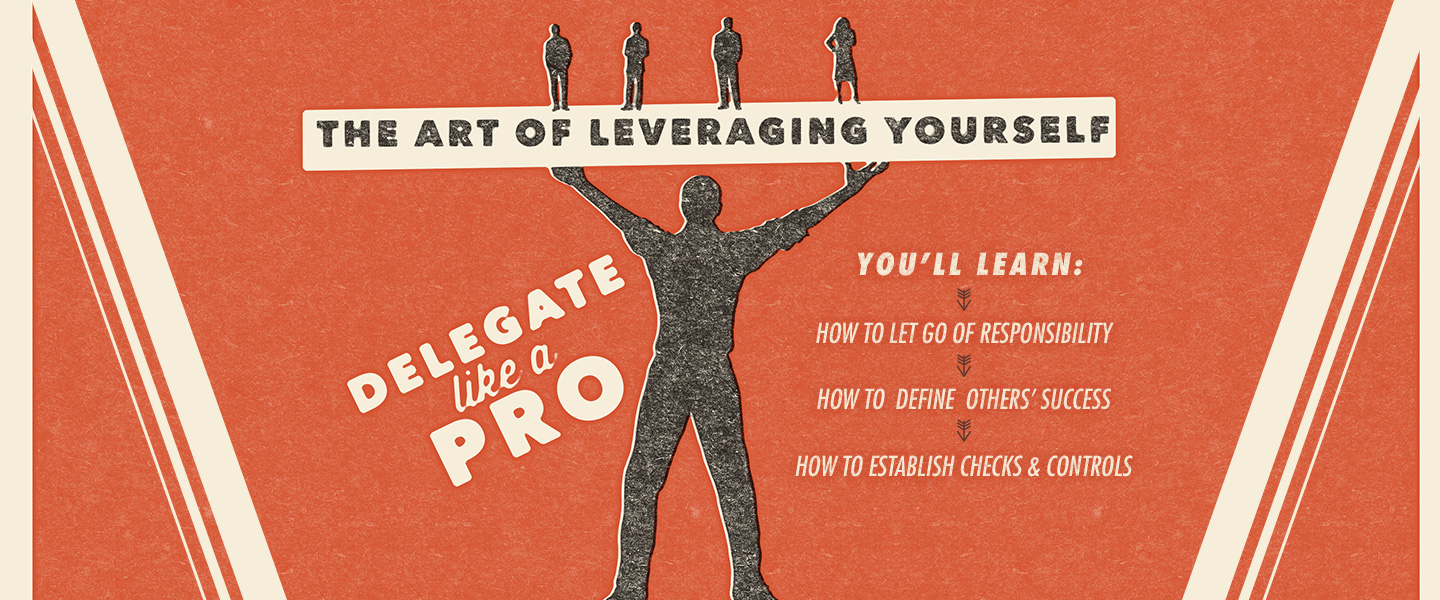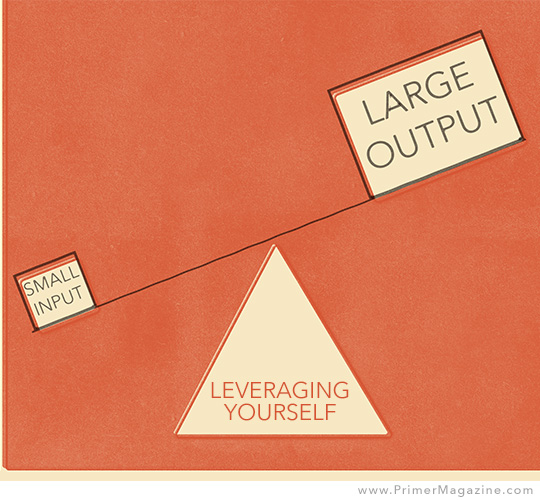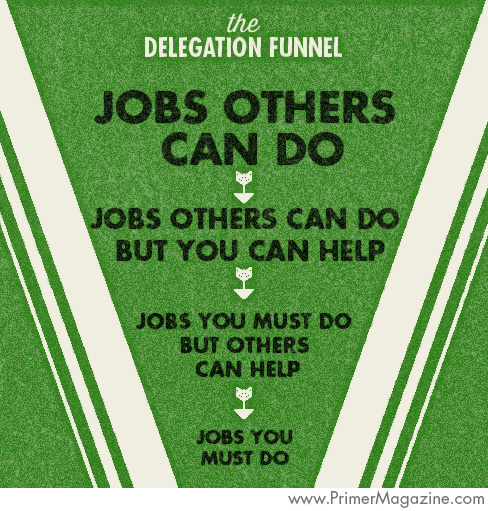As you grow in your career, one of the key skills you need is to be able to delegate. No other skill is more important for elevating yourself and driving your success.
What’s funny is that some people mistakenly think pawning off work on people they supervise is just a perk of moving up the ranks.
I have to admit, it can be enjoyable…especially when you’re offloading work you hate doing. Alright Stan, you’re going to handle all the TPS reports from now on… [evil cackle].
But the truth is, delegating isn’t simply a reward for getting promoted; it’s an essential way to leverage yourself so you get the maximum return on your efforts.
The Art of Leveraging Yourself
The idea of “leverage” is most common in real estate. Instead of shelling out the full cost of a home upfront, you can leverage a small amount of money (a down payment) to get access to a more valuable asset—one that will potentially make a much larger return later on.
Think of delegating in the same terms: when you delegate, you can get the maximum leverage out of yourself. You take your most precious resource—your time and energy—and leverage it to create a much greater output than you could get on your own.
Sadly, not everyone understands the value of delegating. Think about the bad managers you’ve had in the past:
Those weak supervisors who micromanaged you, shadowed you every step of the way—only to provide a miniscule amount of “value” in the form of nitpicking, tweaking, and worst case, even re-doing what you’d already done.
They justified their behavior saying they had a “hands-on” style. But were they really using their time—leveraging themselves—efficiently?
Uh…that’s a big fat no.
What Keeps Us from Delegating
When you are new to leadership, it can seem foreign to delegate. You might worry that you’re passing the buck. Or frankly, you might just plain suck at delegating.
Here are some common pitfalls that can keep you from leveraging yourself properly:
- Belief that you can do the task better, so why bother handing it over to someone else?
- Lack of clarity about what success looks like—so you can’t explain what to do.
- Not wanting to let go of a task you enjoy doing. “But filing is so meditative!”
- Poor planning/disorganization—you don’t think ahead and no one is available to help you.
- Fear of becoming “replaceable” if other people can do your job
- Fear of overburdening your staff.
Any number of these thing can make delegation seem more difficult. So we fool ourselves into thinking the best way to maximize our contribution is to just do it ourselves.
But if you look at any great person—business leader, athlete, you name it—it is extremely rare for a great performer to do everything on his own. Great people realize that empowering their teams is the best use of their energy.
I once had the opportunity to watch David Beckham play soccer live. I hadn’t really seen him play before. But I had heard tales of his amazing goal-scoring abilities.
After watching him play, what struck me most was not the way he could “bend it like”…er..himself while going for goals—in fact, I don’t think he scored a goal the entire game.
Instead, I was amazed how he PASSED the ball.
His ability to spot opportunities and see open team-members was truly brilliant. Rather than focusing on scoring a goal or two on his own…his great passing allowed him to leverage himself even further to make his entire team great.
By delegating tasks, you can accomplish way more than you could on your own. Because when you delegate effectively, like Beckham, you make your whole team better.
The Dangers of Not Delegating
On the other side of the coin, when you don’t delegate you limit your potential.
Rather than enjoying the multiplier effect of improving your team’s output, you cap your contribution at what you can literally accomplish with your own two hands (and one brain, I suppose…).
But lost productivity isn’t the worst of it. Many other horrible things can happen when you’re a manager who can’t delegate:
Overwhelm
As you rise up the ranks your responsibilities only increase; keeping everything for yourself is a sure road to burnout.
Getting Stuck in “The Weeds”
As a manager, you need to be able to step back and see the forest for the trees. If you’re stuck in the minutiae, you can’t be a good leader.
Not Focusing on the Really Important Work
If you’re managing the day-to-day details, are you really able to give the critical, high-level work its due attention? Somebody’s got to take on the extremely tough challenges, and it sure as hell isn’t that new associate with 6 months’ experience.
Alienating Your Team
This may be the worst part. When your direct reports feel like you don’t trust them to do a good job, they can become demotivated. How would Beckham’s team feel if he insisted on scoring all the goals himself and never passed the ball?
6 Tips for Delegating Like a Pro
So, if I’ve convinced you that delegation is a good thing, the next step is learning how to delegate well. Not everyone is good at it. And just like with anything else, it takes practice and some know-how.
I've spent nearly 15 years working in advertising agencies. In that time, I learned a lot of hands-on lessons about the right and wrong way to delegate.
Here are a few of my favorite and effective delegation tips:
Only Do What Only You Can Do
When you’re deciding what you should delegate, start by thinking about what you CAN’T delegate.
The higher up you go, the more you should focus your energies on doing fewer, higher-level things: planning, high-value projects, VIP clients, operational efficiency, etc. Basically, all the things your direct reports can’t do because they don’t have the skills, knowledge, or authority yet.
And everything else? In a perfect world, you should delegate it to the people who support you.
Even if you think you can do a menial task better than the people who report to you, that’s a terrible reason to keep it for yourself. First of all, if you’re a manager or supervisor, that’s likely because you’ve shown some proficiency and skill—so it’s only natural that you could do their jobs better than they can. That doesn’t mean you should.
For each task you keep on your own plate, you’re taking precious time away from tasks that need your attention. You’re a manager now, you’ve got bigger fish to fry. Focus on the critical, high-level stuff, and delegate everything else.
Invest Upfront, Reap the Rewards Later
As I mentioned above, you may initially feel like there’s a huge gap between how well you can do something and how well your direct report can do it. So at first it may feel like a waste of time to delegate the task.
But you have to look at the long-term value. Recognize that if you can invest in training your employee on the task well upfront, you’ll be able to enjoy the rewards going forward.
Yes, you’ll have to spend some time and effort babysitting them in the beginning, but gradually they’ll get better and better. And pretty soon you won’t have to worry about it at all.
Create a Clear Vision of Success
One of the biggest factors for successfully delegating is being able to explain what success looks like.
It’s one thing for you to explain what your employee should do and how. But if they don’t truly understand the objective or recognize the signs of “a job done well” then things won’t go as smoothly.
The more you can explain about the background of the project and the “why” behind it, the more motivated and engaged they’ll be—and the clearer they’ll be about what needs to happen.
Plus, the side benefit—especially as you manage more senior people—is that you can challenge them to come up with better ways of doing things.
When I was a supervisor in ad agencies I would typically say, “Here’s what I need you to do… the objectives are X, Y, Z. I might try it this way. But if you can think of a better way to do it, I’m open to your recommendations.”
You also need to be clear about your expectations of timing. As a general rule, if you set vague expectations, you’ll get vague results. Just because you think a task should be completed within the week doesn’t mean your employee knows you want it then.
Even if there’s no external force dictating the end-date, make sure you set a deadline of when you expect the project to be completed.
While it may sound anal, it can be extremely helpful to whip up a 1-page project brief for more complicated projects. That way you can literally be on the same page about what’s required. Best of all, it forces you to think through what the project entails.
[Sample Project Brief Template]
Background
Any relevant “need to know” backstory or context for the project
Project objectives/goals
What the project needs to achieve. Are there any hard metrics you can use to measure success?
Executional considerations
Suggestion for how you might attack the project; factors to consider, etc.
Resources
Resources they should tap into, including reference material, departments or key people they should talk to.
Deliverable(s)
What exactly are you expecting from them? Do you need an Excel spreadsheet with data, a Word doc with a list or a report, physical samples of something, a video…?
Deadline/key dates
What is the deadline? Are there any other key dates or milestones that are important? Any interim reviews needed by you? (see Check-ins and Controls below)
Establish Check-ins and Controls
Just because you’ve invested in training your employee upfront does not mean you can step away completely. The work is still ultimately your responsibility. So how do you make sure everything goes well?
The simple way to do it is set up controls.
Think about natural points along the life of the project where you can check in and provide guidance. If the task is simple enough, you may not need to check in. But if they’re spending more than a few hours on the project, it’s important that you provide input at key stages. That way they don’t stray too far down the wrong path, potentially wasting time and resources.
These check-ins can take the form of in-person briefings, email updates, simply being kept “in the loop” through cc’s and the occasional meeting. Or more frequently these days, they could be in the form of electronic monitoring programs that provide visibility into project milestones or data. But typically it will be a mixture of all these things.
If you already have a weekly one-on-one with your employee, use this time to get a quick update on the projects or tasks. Typically with my direct reports, I used to set the expectation that throughout the week, we would copy each other on any communications for our projects, so we were always up to speed. As a manager this is helpful, because there were often times where I’d have an Account Executive working on a project, but our client would call me and ask about it. And it was important that I be able to speak to the status of the project even if I wasn’t handling it myself.
Don’t think of this as a “big brother” situation where you’re always watching in order to point out mistakes. Instead, as you monitor their progress, ask yourself: whatever the stage of the project, how can I help make it easier and more efficient for them to do a great job?
Often you can help remove potential barriers to completing the task or provide additional resources. If they’re having an issue getting what they need from another department or from a difficult client, you can quickly step in and help smooth things out.
Put On Your Oxygen Mask First
As I mentioned, in an ideal world you should only be doing the things that only you can do…and you should delegate everything else. In the real world, this isn’t always feasible. In some cases you may still need to help with some of the “grunt-work” if your staff simply doesn’t have enough bandwidth.
But as a general rule, your team should be maxing out before you do. This allows you to maintain perspective and lead from a high level as long as possible.
Have you ever noticed how airlines tell parents to put on their own oxygen masks before assisting their kids? It’s for a similar reason: if a parent passes out, then the child is going to be far less equipped to handle the emergency situation than if the roles were reversed, and now the child needs the rest of the plane to assist them.
As a leader, you need to preserve your judgment and keep a clear head as long as possible. Just as your positive efforts can be leveraged by delegating, your poor decisions and misguided leadership can also be amplified within an organization if you’re not careful.
This does not mean you need to be the jerky boss who leaves at 4:30PM everyday to “go hit the gym again” while your team toils into the late evening cursing your existence. It simply means that you need to lean on your employees to make sure you’re always in a position to be more of a leader than a “doer.”
Use Delegation as a Tool for Mentorship
As your direct reports get more comfortable with the work, you can begin giving them more freedom and autonomy.
You can start challenging them with higher-level projects that they can use to improve their confidence and their skills.
And there’s no reason you can’t begin giving them more difficult tasks so long as you still maintain key check-in points to monitor their progress.
In my experience, the more ownership people have over their work, the more motivated they are to do well. They may not initially feel comfortable taking on a higher-level task. But if you trust them to give it a shot and you’re there as a safety net, they will gradually build their confidence and rise to the occasion.
Win/Win Situation: Delegation Gives You Perspective on Your Own Work
Ok, at this point I know what you you’re thinking: Kyle, how could delegating possibly sound any more awesome?
Well sir, I have more good news.
When I first became a supervisor, I remember my boss telling me something that always stuck with me: When you begin managing someone, ironically it can give you a better perspective on how to approach tasks yourself.
After you start delegating, it forces you to think about how to break down work into manageable chunks. And that can help alleviate stress and make you more efficient even with the tasks you keep for yourself.
Thinking about how to delegate a project also forces you to be clear about what success should look like. And suddenly, what starts as a stressful, confusing and amorphous project, becomes a series of well-defined steps with a clear and achievable end goal.
Whenever I was faced with a complicated project, I recalled my old boss’s advice: I simply asked myself, how would I delegate this project to someone else? And suddenly, the steps I needed to take…as well as any gaps in information…became crystal clear.
How to Start Delegating If You Don't Have a Team
Do you work for yourself or in some other non-corporate environment where you don't have the support of a staff? Or are you dropping the ball in your personal life because you're so consumed by your work responsibilities? There are a ton of internet-based companies that let you outsource tasks or whole projects. Get the benefit of a team or an assistant as often or as little as you need them.
- Upwork: One of the world's largest marketplaces for finding people to do project or task-based work. Post a project, either a one-off or recurring, and pick the best based on the submitted proposals. All the communication and payment is done through the site, and if you have tasks that come up frequently, you can build a relationship with someone who understands your process and what you need. You can find a range of experience, rates, and locations based on your budget and preferences. Whether it's data entry, data analysis, web development, or something creative like design or writing, you can find what you need.
- Fiverr: Similar to Upwork with a focus on the creative fields, generally at lower-priced fixed rates. Don't let the name fool you, there are plenty of solid workers on Fiverr who command more than $5.
- Magic: Magic is an assistant company that is unique because they are all text-based. When you have a lot of little tasks like making appointments or calling to retrieve information or doing surface-level research that may not be consistent, a service you can fire off a text to that charges $10 per hour makes a lot of sense.
- Handy & Task Rabbit: As someone without a team, it's even more important to protect the things you absolutely must do and the things you definitely do not. The latter can include delegating things in your life like hiring cleaners, paying to have your laundry done, offloading the assembly of Ikea furniture, or having someone run across town to process personal returns and other essentials that people often feel wasteful paying to have someone else do. If you can't pay someone to do your essential work, you shouldn't feel bad to pay them to do everything else.
Conclusion
If you’re a new manager you may not feel comfortable delegating at first. But don’t let that stop you from giving it a try. Use the tips above to continue improving your delegation chops. As with anything, practice makes perfect.
Ultimately delegating will become second-nature, and you’ll be thankful you discovered how to truly leverage yourself.
You no longer need to be bound by what you can do alone. Now the only limits to your success are how high you can aim.














![It’s Time to Begin Again: 3 Uncomfortable Frameworks That Will Make Your New Year More Meaningful [Audio Essay + Article]](https://www.primermagazine.com/wp-content/uploads/2025/01/begin_again_feature.jpg)




